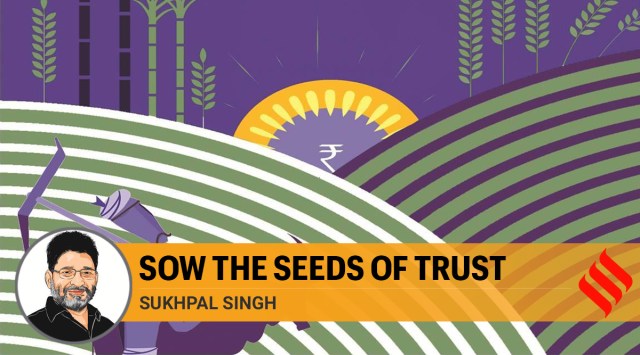- India
- International
Farmers’ apprehensions about role of mandis, terms of procurement under new laws need to be addressed
Demand for MSP as a legal right is not well placed. If private players decide that they will not buy at MSP and rather import agricultural produce, and FCI decides to not procure farm produce for various reasons, where will the farmer sell?
 If APMCs are reduced in importance, they will lose rather than gain unless more of them are organised into FPOs and become attractive to private agencies for contract farming or direct purchase.(Illustration by C R Sasikumar)
If APMCs are reduced in importance, they will lose rather than gain unless more of them are organised into FPOs and become attractive to private agencies for contract farming or direct purchase.(Illustration by C R Sasikumar)
What was seen as a localised Punjab-specific protest against the two new (farm produce trade and commerce and contract farming) and one amended (essential commodities) union Acts about agricultural markets has become a national event, with new farmer groups and national-level farmer alliances joining the protests on the borders of Delhi. The government claims that the farm Acts are for the benefit of farmers and that farmers have not understood the same. The farmers are demanding a repeal of the three Acts, though ECA amendment is not a new Act, and making MSP a legal right of the farmer. There is no doubt that there is some confusion among farmers about some aspects of the new Acts. For example, the way production agreement is defined has led to fear among farmers about contract farming being more about corporate farming though the Act clearly says that farmer land can’t be leased, mortgaged or bought by the contracting agency. But it is important to examine the merits and feasibility of the two demands of protesting farmers.
The Farmer Produce Trade and Commerce (Promotion and Facilitation) Act, popularly known as APMC mandi bypass Act, creates a new “trade area” outside the APMC market yards/sub-yards where any buyer with a Permanent Account Number (PAN) can buy directly from farmer sellers and the state government can’t impose any taxes on such a transaction. Therefore, it is expected that this would lower buying costs for buyers and that would automatically mean higher prices for farmers. But buyers buying at lower cost does not necessarily mean they would pass on the cost saved on procurement to selling farmers. The claim is also made that now farmers would have a choice of channels. This is somewhat misplaced as the majority of the farm produce across India (with the exception of states like Punjab and Haryana) does not go through APMCs. Anybody with a PAN card allowed to buy agricultural produce could mean a free-for-all situation, which is not desirable.
Contract farming, as practised in India across crops and regions for many years, has shown that marginal and small farmers are generally excluded. The problems they face include highly one-sided (pro-contracting agency) contracts, delayed payments, undue rejections and outright cheating besides poor enforcement of contract farming regulation by the state governments. Therefore, a robust contract farming regulation was needed. The Farmers (Empowerment and Protection) Agreement on Price Assurance and Farm Services Act has defined FPOs (farmer producer organisations) as farmers, which restricts them to the supply side, when there is hardly any FPO in farm production, and ignores their role as contract farming agencies. Further, the contract farming Act does not provide for remedies when companies cancel contracts or there is delay in taking delivery of produce.
Another problematic aspect of the Act is that it says the sponsor would also pay, besides the minimum guaranteed price, a premium or bonus which will be linked to APMC or e-trading price. This goes against the very concept of contract farming. The contract price should be left to the contracting parties to decide. Further, if the understanding is that mandis are not discovering prices well, then why peg the contract price to such mandi price? The government must go back to the 2003 Model APMC Act, which also had model contract agreement with mandatory and optional provisions in a contract.

Opinion | Ashok Gulati writes: Centre must carefully consider options, close communication gap with farmers
In the 2003 Model APMC Act, the APMC was supposed to resolve the disputes. This was a better system because the farmer knew and was familiar with the system. Further, when a licence is given to a trader or commission agent, there is a counterparty risk assurance. In major agricultural states, APMCs are multi-stakeholder elected bodies. Only Punjab has not had an election to APMCs in the last 40 years. In the new trade area, there is no mechanism to provide counterparty risk.
The apprehension about MSP and procurement going away comes from Acts being linked to some previous policy documents like the Shanta Kumar Committee report and the CACP reports suggesting reduced procurement and an end to open-ended procurement from states like Punjab to cut down costs of FCI. It is feared that FCI itself may start procuring directly from the new trade area to cut down buying costs like market fees and arhtiya commission. It is more about the changes in the “social contract” between the state’s farmers and the Union government that is the root cause of this apprehension.
The demand for legal backing to MSP also arises from the fact that the government has been announcing MSP for 23 crops, but procurement is limited to a few crops and a few states and farmers end up selling at below MSP. Also, CACP in one of its reports in 2017-18 (kharif) suggested that “to instil confidence among farmers for procurement of their produce, a legislation conferring on farmers ‘the right to sell at MSP’ may be brought out.”
But the demand for MSP as a legal right is not well placed. If private players decide that they will not buy at MSP and rather import agricultural produce, and FCI decides to not procure farm produce for various reasons, where will the farmer sell? Punjab’s amendments to farm Acts — making MSP mandatory for wheat and paddy and any purchase punishable with imprisonment or fine if farmer is forced to sell at below MSP — are ill-advised as this law will discourage private buyers from buying. Further, how can it be proved that a farmer has been forced to sell her produce at below MSP if a farmer desperate to sell ends up consenting to sell at below MSP? It is difficult to enforce such a law. Private agricultural markets cannot be run through such diktats.
Currently, selling in the private market is the last option for farmers where public procurement does not take place. By creating stringent rules (fine or imprisonment), the government may create a situation where farmers would not be able to sell at all. Maharashtra attempted this legality in 2018 in its APMC Act but had to reverse it after protests by traders. It is important to realise that MSP is a political or administrative promise or decision made by the government to farmers. Why should a private player be tied to it and be penalised? On the other hand, when the government is trying to liberalise and open the market to encourage private buyers, then it can’t, at the same time, mandate at what price they should buy.
For small and marginal farmers, APMC mandi is the last resort channel of sale. If APMCs are reduced in importance, they will lose rather than gain unless more of them are organised into FPOs and become attractive to private agencies for contract farming or direct purchase.
This article first appeared in the print edition on December 2, 2020 under the title ‘Sow the seeds of trust’. The writer is a professor at IIM Ahmedabad. Views are personal
Explained | Who are the Punjab and Haryana farmers protesting in Delhi, and why?
EXPRESS OPINION
More Explained
Apr 26: Latest News
- 01
- 02
- 03
- 04
- 05










































